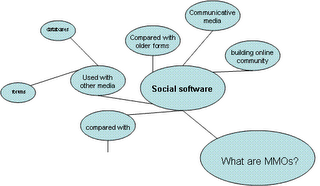
Well, as you may have heard by now,
Ms. Dewey is a brand new search engine that is taking a run at
Google. Reviews are all over the blogosphere now. However, it's so unique that I'm going to hop onto the Blogosphere Express and offer my two cents:
(1) Interface - Well, what more can I say. It's definitely a diversion from Google's simplicity. There's more to
look at, that's for sure. But I like it. It's fresh, dynamic, and interactive. The only drawback is that the search results are a bit cumbersome to navigate.
(2) Web 2.0-compatible - To date, there's still no search engine that makes witty comments, shows signs of moodiness, and has an interest in your searches. True, it's artificial, but it's still not a bad attempt at user interaction. When one types in a search term or phrase,
Janina offers a commentary. If the question is bizarre enough,
Janina might even perform a short skit.
(3) Effectiveness - In the end, the question is, can it do what it's supposed to do? I've done quite a few searches. It's definitely no
Google. A little trick that I use to determine an engine's effectiveness is to try finding a journal article by simply by typing in the full (or partial)
article title. Ms. Dewey unfortunately comes up short (but so does
Yahoo! and
MSN Live). Google still rules at the end of the day.
(4) A new type of search engine - The "traditional" search engine days of Google and Yahoo! are increasingly challenged by up and comers. The clustering search engines such as
Clusty and
Vivisimo are great tools; and the visual search engines like
Kartoo are also great as well. And now we have the "interactive" search engine. What does this all mean? There's still a ways to go before Ms. Dewey can offer us searchers something substantial. Perhaps
Janina can offer a witty remark to that.
 Not surprisingly, some people are disturbed with Web 2.0. What is it? What makes it so different from Web 1.0? What is Web 1.0? It is understandable that there is anxiety, coupled with a certain element of skepticism.
Not surprisingly, some people are disturbed with Web 2.0. What is it? What makes it so different from Web 1.0? What is Web 1.0? It is understandable that there is anxiety, coupled with a certain element of skepticism.














